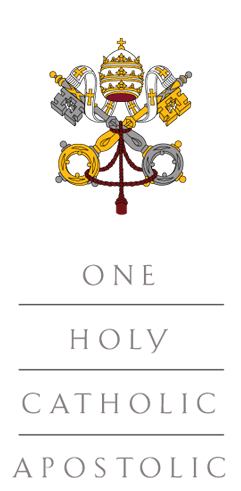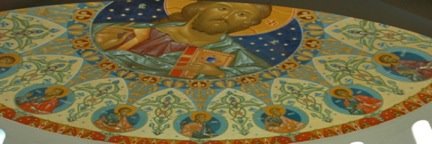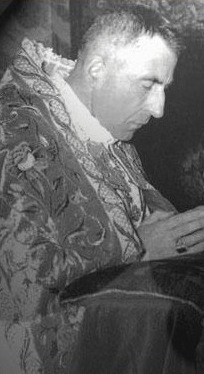Receive me today, Son of God, as a partaker of Your mystical supper; for I will not reveal Your mystery to Your enemies, nor give you a kiss as did Judas. But as the thief I confess to You: Lord, remember me in Your kingdom.
On Great & Holy Thursday the Holy Fathers draw our attention to four events: the washing of the feet, the Mystical Supper, the agonizing Prayer and the Seizing of the Lord.
The Church turns to the events that occurred in the Upper Room and at the garden of Gethsemane. In the Upper Room, Jesus established and instituted the Mystery of the Holy Eucharist. At the Mystical Supper, He gave a radically new meaning to the food and drink of the sacred meal. He identified Himself with the bread and wine: "Take, eat, this is my Body.... Drink of it all of you, for this is my Blood of the New Covenant."
We have learned to equate food with life because it sustains our earthly existence. In the Eucharist the distinctively unique human food--- bread and wine--- becomes our gift of life. Consecrated and sanctified, the bread and wine become the Body and Blood of Christ. This change is not physical but mystical and sacramental. While the qualities of bread and wine remain, we partake of the true Body and Blood of Christ. In the eucharistic meal God enters into such a communion of life that He feeds humanity with His own being, while still remaining distinct. In the words of St. Maximos the Confessor, Christ, "transmits to us divine life, making Himself eatable." The Author of Life shatters the limitations of our createdness, Christ acts that "we might become sharers of divine nature."
The Eucharist is at the center of the Chur
 ch's life. It is her most profound prayer and principal activity. It is at one and the same time the source and the summit of her life. In the Eucharist, the Church manifests her true nature and is continuously changed from a human community into the Body of Christ, the Temple of the Holy Spirit, and the People of God. In the Eucharist the Church remembers and enacts sacramentally the redemptive event of the Cross and participates in its saving grace. The Eucharist goes not repeat what cannot be repeated. Christ is not slain anew and repeatedly. Rather the Eucharistic food is changed concretely and really into the Body and Blood of the Lamb of God, "Who gave Himself up for the life of the world." In the Eucharist we receive and partake of the resurrected Christ. We share in His sacrificed, risen and deified Body, "for the remission of sins and life eternal." In the Eucharist Christ pours into us-- as a permanent and constant gift-- the Holy Spirit, "Who bears witness with out spirit that we are children of God-- and if children-- then heirs with Christ."
ch's life. It is her most profound prayer and principal activity. It is at one and the same time the source and the summit of her life. In the Eucharist, the Church manifests her true nature and is continuously changed from a human community into the Body of Christ, the Temple of the Holy Spirit, and the People of God. In the Eucharist the Church remembers and enacts sacramentally the redemptive event of the Cross and participates in its saving grace. The Eucharist goes not repeat what cannot be repeated. Christ is not slain anew and repeatedly. Rather the Eucharistic food is changed concretely and really into the Body and Blood of the Lamb of God, "Who gave Himself up for the life of the world." In the Eucharist we receive and partake of the resurrected Christ. We share in His sacrificed, risen and deified Body, "for the remission of sins and life eternal." In the Eucharist Christ pours into us-- as a permanent and constant gift-- the Holy Spirit, "Who bears witness with out spirit that we are children of God-- and if children-- then heirs with Christ."The events initiated by Jesus at the Mystical Supper were profoundly significant. By teaching and giving his disciples His final instructions and praying for them as well, He revealed again His divine Sonship and authority. By establishing the Eucharist, he enshrines to perfection God's most intimate purposes for our salvation, offering Himself as Communion and life. By washing the feet of His disciples, He summarized the meaning of His ministry, manifested His perfect love and revealed His profound humility.

The act of washing of the feet (John 12:2-17) is closely related to the sacrifice of the Cross. Both reveal aspects of Christ's kenosis. While the Cross constitutes the ultimate manifestation of Christ's perfect obedience to His Father, the washing of the feet signifies His intense love and the giving of Himself to each person's ability to receive Him.
Another significant episode leading to the Passion was the prayer and agony in the Garden of Gethsemane. Although Jesus was the Son of God, He was destined as man to accept fully the human condition, to experience suffering and to learn obedience. Divesting himself of divine prerogatives, the Son of God assumed the role of a servant. He lived a truly human existence. Though He Himself was sinless, He allied Himself with the whole human race, identified with the human predicament and experienced the same tests. The moving events in the Garden of Gethsemane dramatically and poignantly disclosed the human nature of Christ. The sacrifice He was to endure for the salvation of the world was imminent. Death, with all its brutal force and fury, stared directly at Him. Its terrible burden and fear-- the calamitous result of the ancestral sin-- caused Him intense sorrow and pain. Instinctively, as a man He sought to escape it. He found Himself in a moment of decision. In His agony he prayed to His Father: "Abba, Father, all things are possible to Thee; remove this cup from me; yet not what I will, but what Thou will."

Jesus offered His unconditional love and trust to the Father. He reached the extreme limits of self-denial-- "not what I will"-- in order to accomplish His Father's will. His acceptance of death was not some kind of stoic passivity and resignation but an act of absolute love and obedience. In that moment of decision, when He declared His acceptance of death to be in agreement with the Father's will, he broke the power of the fear of death with all its attending uncertainties anxieties and limitations. He learned obedience and fulfilled the divine plan.
Prayer is the power that fuels the spiritual life. As breathing, eating, drinking, and thinking are essential to human existence, prayer is a fundamental element and activity of the Christian life. Authentic Orthodox spirituality is constituted by a vibrant prayer life rooted in the life of the Church, her faith and her sacraments; and related, as well, to the practice of fasting, which is seen primarily as obedience to and love for God, the transformation of the passions, and acts of charity. Prayer is the most sublime experience of the human soul. Without it the soul is left cold and spiritless. It cannot enter into a sustained personal relationship with God.
Prayer is an act of faith. It brings us to the threshold of another world. Through it we reach and cross the ultimate frontier. We touch another world, which we come to experience as extraordinary peace, beauty, goodness, joy and trust. We encounter the living God and converse with Him. The Holy One, who alone has existence, embraces us with his tender mercy, compassion and love. Divine light
 penetrates the depths of our soul to reveal our sins, purge our iniquities, heal our brokenness, illumine our intellect, strengthen our will, and gladden our heart.
penetrates the depths of our soul to reveal our sins, purge our iniquities, heal our brokenness, illumine our intellect, strengthen our will, and gladden our heart.At the Garden of Gethsemane, Judas betrayed Christ with a kiss, the sign of friendship and love. The betrayal and crucifixion of Christ carried the ancestral sin to its extreme limits. In these
 two acts the rebellion against God reached its maximum capacity. The seduction of man in paradise culminated in the death of God in the flesh. To be victorious evil must quench the light and discredit the good. In the end, however, it shows itself to be a lie, an absurdity and sheer madness. The death and resurrection of Christ rendered evil powerless.
two acts the rebellion against God reached its maximum capacity. The seduction of man in paradise culminated in the death of God in the flesh. To be victorious evil must quench the light and discredit the good. In the end, however, it shows itself to be a lie, an absurdity and sheer madness. The death and resurrection of Christ rendered evil powerless.On Great Thursday light and darkness, joy and sorrow are so strangely mixed. At the Upper Room and in Gethsemane the light of the kingdom and the darkness of hell come through simultaneously. The way of life and the way of death converge. We meet them both in our journey through life.







































No comments:
Post a Comment